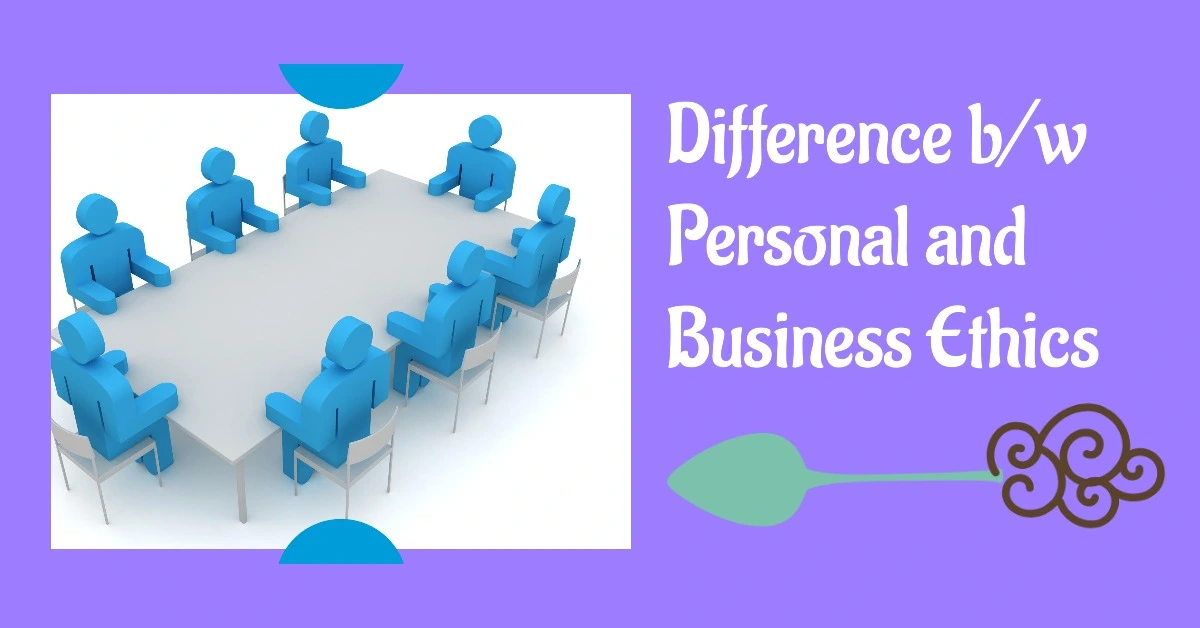Ethics refers to the set of moral principles that guide our behavior and decisions. Understanding the difference between personal and business ethics is crucial, as they dictate how we conduct ourselves across different domains of life.
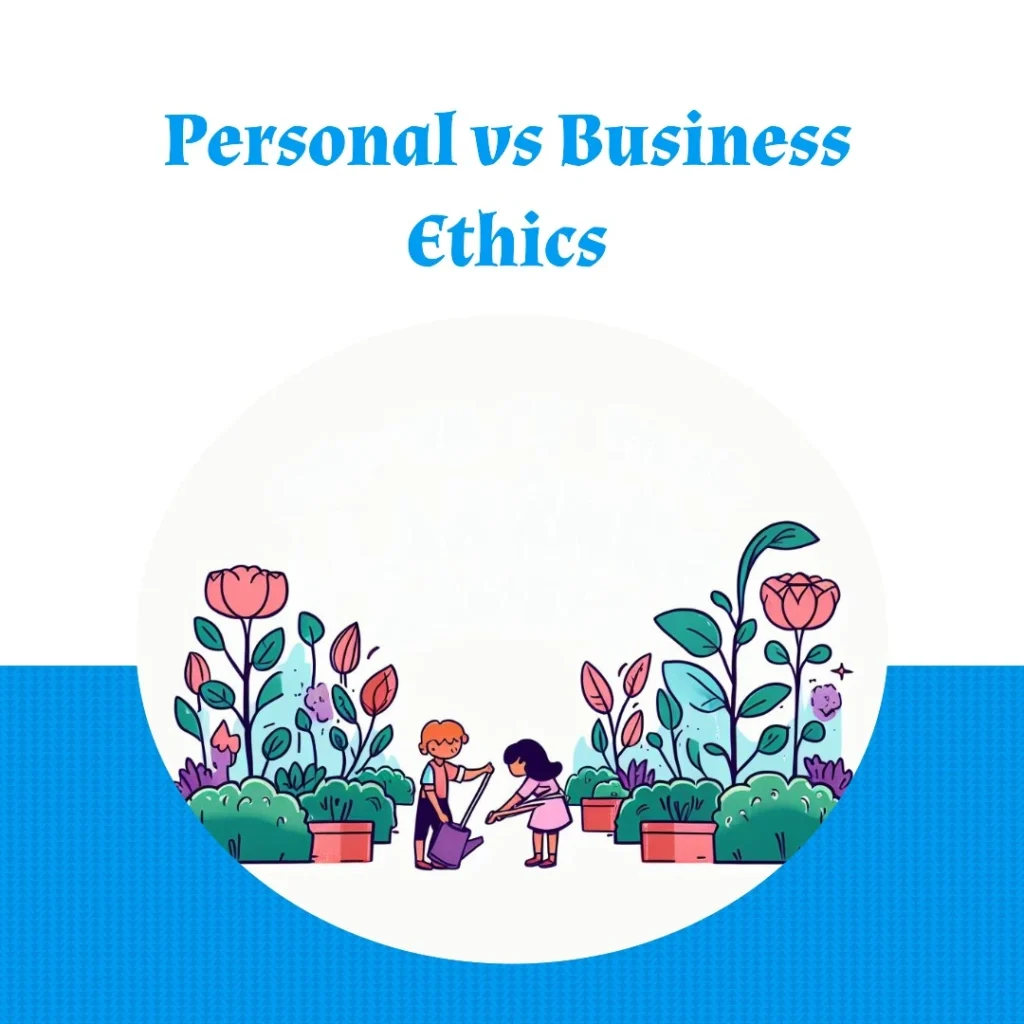
While personal ethics stem from our values and beliefs, business ethics involve the moral code of conduct expected in professional settings. Both play an integral role: our personal ethics shape who we are, while professional ethics ensure organizations function responsibly.
This article will examine the distinguishing factors between individual and corporate ethical frameworks, evaluating where the two may align or diverge. We will explore real-world examples of ethical decision-making in personal versus work contexts.
By distinguishing between these categories of ethics, individuals can better navigate moral conflicts that may arise in their professional lives. Ultimately, comprehending the contrasts provides clarity on how to act with integrity in the corporate world.
What is Personal And Business Ethics?
Personal Ethics
Personal ethics refers to an individual’s own set of moral values, principles, and beliefs that guide their behavior and decisions in everyday life. Shaped by upbringing, culture, and religion, our ethics stem from an inner moral code dictating what we inherently believe is right or wrong.
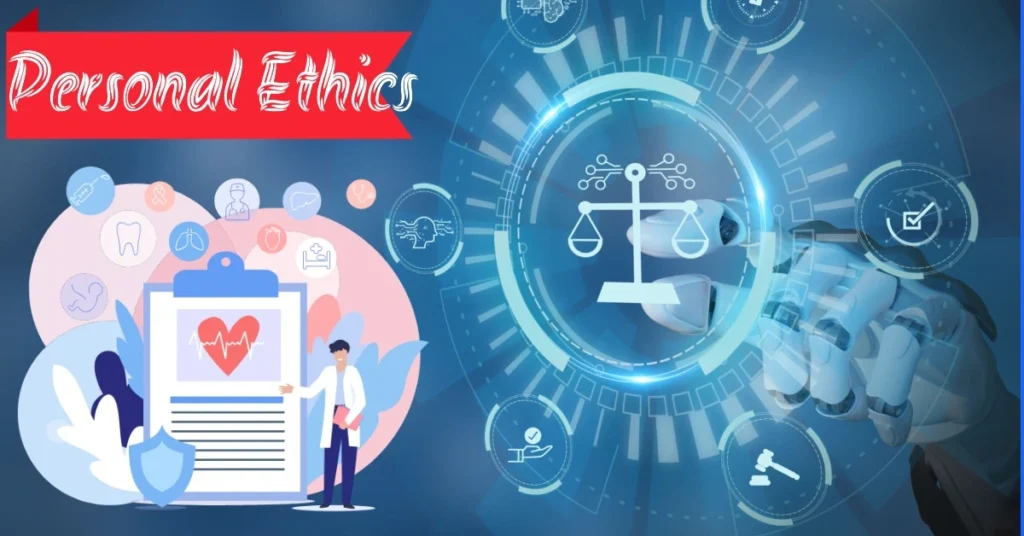
Basic ethical values that commonly shape personal ethics include honesty, integrity, respect, fairness, and compassion. When faced with ethical dilemmas or choices in personal contexts, we refer to this inner compass of core values to make judgments on the morally correct course of action.
Elements such as conscience, consequences, duties, and character collectively shape the ethical decision-making process. Ultimately, our ethics serve as the foundation for conducting ourselves, interacting with others, and embodying virtuous principles.
Business Ethics
Professional business ethics refer to the moral code of conduct required in the workplace and business dealings. Also known as business ethics, they encompass the ethical standards, guidelines, and expectations set by an industry or organization to ensure lawful, responsible, and ethical operations.
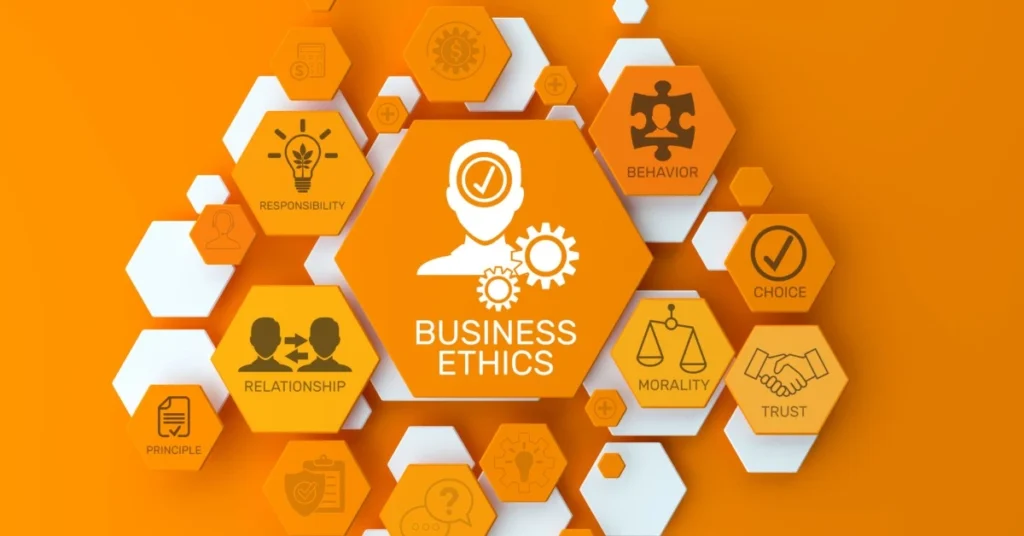
Companies typically have a Code of Conduct outlining standards for employee integrity, work practices, confidentiality, conflicts of interest, and more. Members of certain professions like medicine, law, and accounting also adhere to explicit professional codes of ethics that guide core values like client privacy and public welfare.
Acting ethically in the corporate world involves fair practices, transparency, accountability, and commitment to these ethical guidelines. When faced with moral conflicts on the job, professionals employ ethical frameworks to evaluate consequences and duties, striving to uphold virtues of trustworthiness and justice. In this way, professional ethics enable principled judgment and behavior even in high-pressure business contexts.
The Intersection of Personal and Business Ethics
There can be an overlap between our personal ethics and professional ethics, as these moral frameworks often influence one another. For instance, someone who values compassion in their personal life may approach business decisions with care for how they impact others.
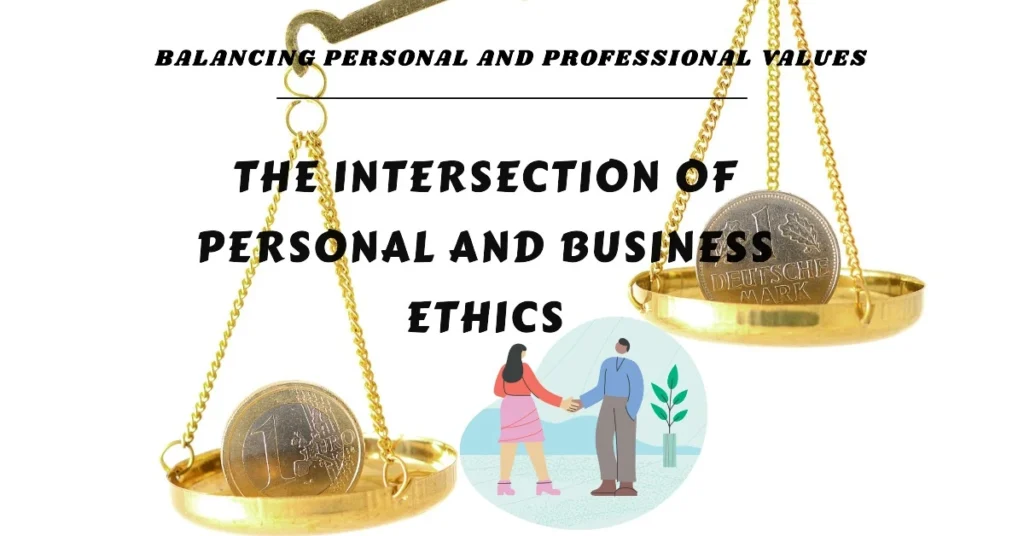
However, one’s values don’t always align perfectly with workplace ethics. A journalist’s commitment to transparency may conflict with a news company’s policies on confidentiality. In such cases, professional responsibilities generally take priority over personal beliefs.
Still, organizations like the New Zealand Police integrate officers’ virtues into a shared moral code to align personal and professional conduct. The New Zealand Medical Association also encourages doctors to uphold their conscience while observing the medical profession’s ethical standards. Ultimately, our personal and business worlds intersect, so maintaining ethical behavior requires finding a balance between the two.
Difference b/w Personal and Business Ethics
| Criteria | Personal Ethics | Business Ethics |
|---|---|---|
| Definition | An individual’s own set of moral principles and values that guide behavior in everyday life | The standards of moral conduct required by an organization or industry in the workplace |
| Focus | Dictates how an individual ought to act in personal contexts | Governs how employees and organizations should operate in business dealings |
| Source | Shaped by upbringing, culture, religion, and personal experiences | Established through organizational policies, industry codes of conduct, and professional association guidelines |
| Motivation | Driven by desire to live virtuously and do what one believes is right | Motivated by adherence to rules and obligations within a profession |
| Accountability | Accountable only to oneself and close relations | Accountable to employer, professional body, clients, and the public |
| Values | Integrity, honesty, fairness, compassion | Client welfare, transparency, accountability, trustworthiness |
| Flexibility | Can adapt values to suit changing circumstances | More rigid standards that must be strictly upheld |
| Conflicts | Interpersonal conflicts with friends/family | Dilemmas between policies, ethics, stakeholders |
| Consequences | Impacts personal relationships and self-concept | Can affect business operations, public trust, career |
In summary, while personal ethics provide a moral foundation, professional business ethics are needed to maintain ethics across industries. The two realms intersect but differences require balancing personal beliefs with corporate duties. By understanding this distinction, individuals can excel in both personal and professional life.
Developing and Upholding Ethical Standards
Cultivating strong ethical standards requires self-reflection to clarify your core values, as well as a commitment to aligning actions with principles. In your personal life, seek out role models and learn from scriptures or philosophies you find inspiring. Discuss ethical dilemmas with trusted advisors to challenge your thinking.
At work, proactively learn your employer’s ethical guidelines and professional code of conduct. Study the mission of exemplary leaders and organizations. Training programs, case studies, and open discussions help embed ethical decision-making skills. When facing unclear situations, consider stakeholder impacts through the lenses of utilitarian, deontological, and social contract ethics.
Documenting your moral reasoning can help strengthen principled habits. Across both personal and professional contexts, accountability, transparency, and clear communication are key to upholding ethics.
Ethics in Leadership and Organizations
Leadership ethics establish the moral tone of an entire organization. Executives with high integrity inspire principled conduct in others and drive ethical business practices.
By openly modeling values like trust, honesty, and concern for people and society, ethical leaders exemplify “nobility in business.” They institutionalize ethics through training programs, accountability structures, and the inclusion of morality in strategy and policies.
Ethical organizations also enact Codes of Conduct enshrining sound judgment, along with confidential hotlines for reporting issues. A culture of transparency balances appropriate openness and disclosures with respecting sensitive information.
Wise leaders understand grey areas like navigating confidentiality while also maintaining accountability and trust. Ultimately, the most sustainable and socially responsible businesses are built on strong ethical foundations at the leadership and organizational levels.
Building an Ethical Organizational Culture
Creating an ethical company culture involves leadership commitment, clear ethical codes, and continuous training for effective moral decision-making. Accountability is reinforced through audits and transparency, while confidential reporting and anti-retaliation policies promote open communication. Rewards should focus on principled behavior, not solely on profits.
Crucial Points:
- Foundation of Ethical Codes: The creation of comprehensive ethical codes is the first step in fostering an ethical culture. These codes serve as a clear guide for expected behavior and decision-making, aligning with the organization’s core values and moral principles.
- Ethical Training and Awareness: Regular training sessions are crucial in ingraining these ethical standards in every employee’s mindset. This includes workshops on ethical decision-making, understanding the Code of Conduct, and navigating moral conflicts effectively.
- Leadership’s Role in Ethical Practices: The tone for ethical behavior is set at the top. Leadership must not only endorse but also embody ethical practices. Their commitment to ethical leadership and transparency significantly influences the organization’s ethical climate.
- Encouraging Open Dialogue: Creating channels for open communication where employees can discuss ethical dilemmas and report unethical behavior without fear of retribution is essential. This openness fosters a culture of trust and ethical behavior.
- Accountability and Enforcement: Implementing a system where ethical breaches are fairly and consistently addressed reinforces the importance of ethical behavior. This includes clear policies on confidentiality, professional discipline, and adherence to ethical guidelines.
- Continuous Evaluation and Improvement: An ethical culture is not static. Regular assessments and updates to the ethical framework ensure that it remains relevant and effective in addressing new ethical challenges in the corporate world.
In summary, organizational ethics hinge on aligned policies, leadership, and culture, reinforced by annual training and ethical health surveys. Cultivating a reputation for impeccable conduct creates a positive cycle, where shared values nurtured within the organization lead to mutual growth.
Case Studies and Real-World Examples
In practice, clashes between individual moral values and company demands frequently arise. A salesperson may experience ethical dilemmas between personal truthfulness and pressure to overstate product claims. Similarly, a finance professional’s ethical principles of transparency could conflict with a corporate culture of obscuring financial details from regulators.
For instance, an accountant at a firm discovered his superiors used shady accounting to mislead investors. His professional responsibilities dictated reporting this unethical behavior internally first. However, after those reports were buried, his ethics compelled him to blow the whistle to authorities externally despite fear of retaliation. Here, he prioritized integrity over job security.
Conversely, a bank executive approved reckless loans to maximize profits and bonuses, aware many would default. When the housing bubble burst, the bank nearly collapsed. In this case, the executive obeyed questionable company practices rather than his moral judgment.
These examples illustrate how ethical dilemmas arise when personal conscience clashes with corporate pressure and questionable conduct. Navigating such grey areas requires moral courage. As shown, those who violate individual ethics for professional duty or gain often cause greater harm. Training in ethical reasoning helps equip professionals to make difficult choices guided by virtue.
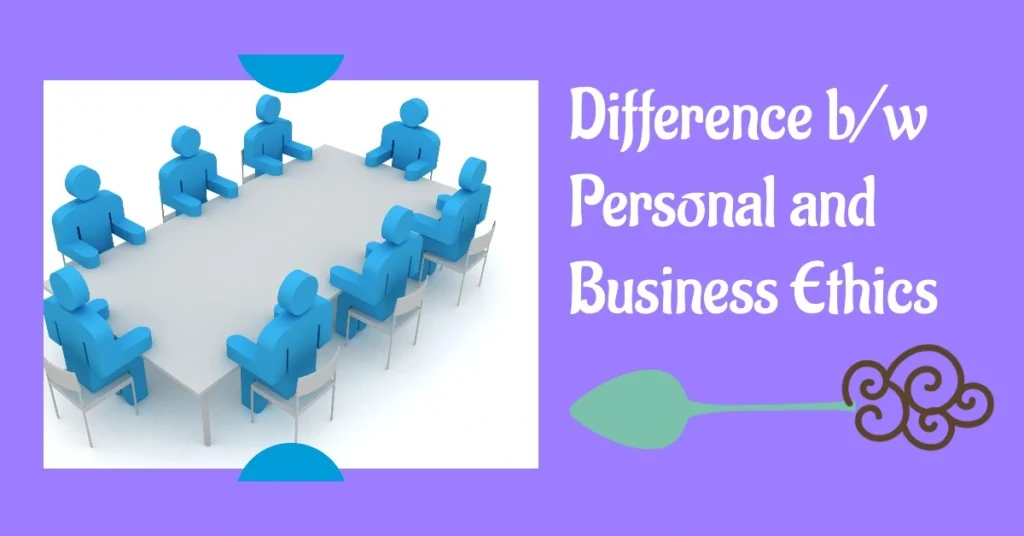
Bottom Line
In review, personal ethics derive from individual moral values, while professional ethics involve standards of conduct set by organizations and industries. Though intertwined, key differences exist between these frameworks for evaluating appropriate behavior.
Personal ethics tend to be more flexible and accountable only to oneself, whereas business ethics require stricter adherence to codes of conduct and accountability to companies, clients, and the public. When the two realms conflict significantly, ethical decision-making involves careful analysis of duties, potential actions, and likely consequences through various ethical lenses.
Training in moral reasoning can help navigate ethical dilemmas. Ultimately, maintaining integrity in one’s work and personal life requires a commitment to ethical principles and the courage to stand by them when tested. Organizations and individuals alike thrive when core values of honesty, accountability, and care for society are woven into all business and human affairs.

